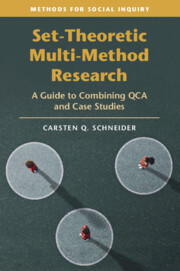1 - Introduction: SMMR in a Nutshell
Published online by Cambridge University Press: 22 February 2024
Summary
This introductory chapter situates SMMR in the broader context of the literature on multi-method research. It outlines the key basic elements of SMMR: the notion of cross-case and within-case level analyses; the descriptive and causal inference analytic goals of SMMR; the main types of cases (typical, deviant consistency, deviant coverage, and individually irrelevant (iir)); single-case and comparative SMMR designs; types of sets; types of QCA solution formulas; and a flowchart of the process of performing SMMR. In the section on useful practical information, the chapter details the prerequisites for successfully mastering the material contained in the book; the use of example data and of resources contained in the book; key SMMR terminology; and the structure of the book, which follows the logic of starting with simple examples and then increasing complexity chapter by chapter.
Keywords
Information
- Type
- Chapter
- Information
- Set-Theoretic Multi-Method ResearchA Guide to Combining QCA and Case Studies, pp. 1 - 29Publisher: Cambridge University PressPrint publication year: 2024
